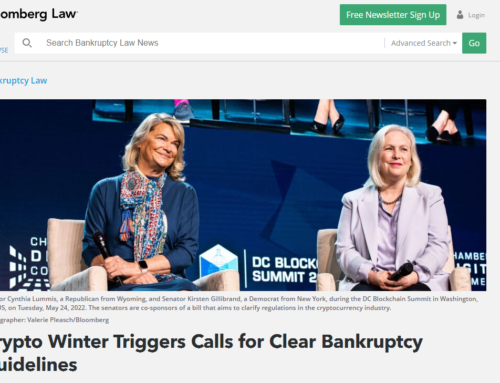Breadth of Crypto Rules Top of Mind After Amendment Failure
Sep. 7, 2021
By Fredrick Lee
The potential breadth of the cryptocurrency reporting requirements included in the bipartisan
infrastructure bill is a top concern for the industry despite assurances from at least one
lawmaker that the rules won’t be overly broad.
There is a concern in the cryptocurrency industry that miners, stakers, and hardware and
software providers could be swept up in the cryptocurrency reporting requirement language,
Lisa M. Zarlenga of Steptoe & Johnson LLP said during a September 2 Urban-Brookings Tax
Policy Center webcast.
The current regulations under section 6045 are drafted in a way that applies to brokers in a
traditional sense — persons acting as principals or agents that effectuate transfers on behalf of
customers, said Zarlenga. “If the government takes that same approach with respect to digital
assets, then I think in the end, they’re going to be fine. If they start getting very aggressive and
try to reach some of these other players, I think there probably would be some issues.”
A House Rules Committee rule blocking further amendments to the bipartisan infrastructure
package (H.R. 3684) came shortly after senators attempted to amend the cryptocurrency
provision in the lead up to the bill’s passage in the Senate August 10. But Tax Notes has heard
from industry stakeholders with concerns about the ramifications of the broad definition of
broker offered in the legislation and the need for more work on the reporting requirements.
“Node providers and developers affected by the proposed law are already exploring alternative
options to other jurisdictions if Treasury does not clarify the language,” according to Howard
Greenberg of the American Blockchain and Cryptocurrency Association. He added that his
association continues to reach out to lawmakers, staff, and regulators to discuss industry
concerns because there are no processes to comply with the proposed reporting.
“We have seen a willingness to engage in this meaningful dialogue,” Greenberg said. “We look
forward to more clarity in the future and are hopeful of a positive outcome.”
Mishkin Santa of the Wolf Group PC said that the proposed reporting provisions are simply
unworkable and should be struck from the final bill and replaced with substitute revenue raisers.
“In essence, these proposed rules are taking methods used for reporting on a centralized system and imposing them on a decentralized system,” Santa said. “Even worse, there is no real plan to assist with providing guidance, insight, and software solutions needed by the wide
variety of crypto brokers this would apply to.”
Even if the broker definition were to be narrowed by Treasury, Santa said it would be logistically
difficult for most cryptocurrency brokers to comply with the provisions in their current form by the
proposed January 1, 2023, effective date.
“Congress should really take up all the issues — both tax and nontax — related to cryptocurrency
in a separate and comprehensive bill,” Santa said. “We should be asking the crypto community
to provide input and comments so that they can feel they are an invested stakeholder in the final
legislation. There has to be a unified approach.”
Limited Scope
Senate Finance Committee member Mark R. Warner, D-Va., took to Twitter August 11 to
defend the bipartisan infrastructure bill’s cryptocurrency rules and attempt to assuage concerns
that they are overly broad.
Warner tweeted that the Biden administration reiterated to all senators involved in drafting the
cryptocurrency provision that the new rules wouldn’t extend to parts of the crypto ecosystem
where entities wouldn’t, in their normal courses of business, be able to collect the relevant
information for tax reporting.
“They’ve made clear the scope of these provisions is limited — and said repeatedly to senators
that it would not capture miners in proof of work contexts, nor validators in proof of stake
contexts,” Warner wrote.
Fellow Senate Finance Committee member Rob Portman, R-Ohio, largely defended the
cryptocurrency rules included in the original infrastructure bill text in a floor speech August 8, but
he added that it would be helpful to have more clarification from lawmakers on the
cryptocurrency provision and who it would and wouldn’t involve.
The bipartisan infrastructure bill seeks to amend section 6045 to include any person responsible
for regularly providing any service effectuating transfers of digital assets on behalf of another
person under the definition of a broker.
Cryptocurrency miners would have to change the way they operate to comply with the
information reporting rules, said Zarlenga, adding that rather than doing that, miners would most
likely go offshore and set up their operations elsewhere.
Right now, there’s no uniformity regarding reporting among cryptocurrency exchanges or other
intermediaries, said Zarlenga, adding that some exchanges report on forms 1099-K,
1099-MISC, and 1099-B, while some don’t provide any information reporting.
Zarlenga explained that in 2014, the IRS and Treasury issued guidance that says that
convertible virtual currency is treated as property for tax purposes and not as currency, so any
rules that would apply to property transactions would apply to virtual currency transactions.


